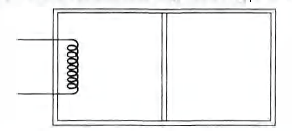Q.
The rectangular box shown in figure has a partition which
can slide without friction along the length of the box.
Initially each of the two chambers of the box has one mole of
a monoatomic ideal gas ($\gamma$ = 5/3) at a pressure p$_0$, volume V$_0$
and temperature T$_0$. The chamber on the left is slowly heated
by an electric heater. The walls of the box and the partition
are thermally insulated. Heat loss through the lead wires of
the heater is negligible. The gas in the left chamber expands
pushing the partition until the final pressure in both chambers
becomes 243p$_0$/32. Determine (a) the final temperature of
the gas in each chamber and (b) the work done by the gas in
the right chamber.
IIT JEEIIT JEE 1984Thermodynamics
Solution: